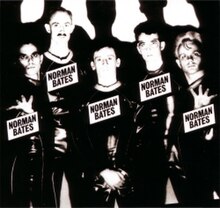Landscape (band)
Landscape | |
|---|---|
 | |
| Background information | |
| Origin | London, United Kingdom |
| Genres | |
| Years active | 1975–1983 |
| Labels |
|
| Past members |
|
| Website | landscape |
Landscape were an English synth-pop band, best known for the 1981 hits "Einstein a Go-Go" and "Norman Bates". Formed in London in 1975,[2] the band toured constantly during the mid-to-late-1970s, playing rock, punk and jazz venues and releasing two instrumental EPs on its own Event Horizon label. The group began experimenting with computer-programmed music and electronic drums in the late 1970s and early 1980s, making records in the emerging genre of synth-pop.
Formation
[edit]Landscape comprises Richard James Burgess (drums, computer programming, synths, vocals), Christopher Heaton (keyboard synthesizers, piano, vocals), Andy Pask (fretted and fretless basses, bass synth, vocals), Peter Thoms (trombone, electric trombone, vocals), and John L. Walters (lyricon, soprano sax, alto flute, computer programming, synths, vocals).[2] The band built a following through live performances, touring and founding the indie label Event Horizon, through which they released two EPs.[2] After signing to RCA they released their debut studio album Landscape in 1979.[2] Their next studio album in 1981, From the Tea-rooms of Mars ...., included the Top 5 UK hit "Einstein a Go-Go" and "Norman Bates".[2] Their third studio album was 1982's Manhattan Boogie-Woogie.[2] After release of this album, Heaton and Thoms left the band.[3]
Landscape III
[edit]Following the release of Landscape's third and final studio album, Manhattan Boogie-Woogie, the band became a trio, composed of Burgess, Pask, and Walters.[2] Renaming the band Landscape III, the members went on to release the singles "So Good, So Pure, So Kind" and "You Know How to Hurt Me".[4] The trio broke up in 1984 and band members went on to separate careers.[2]
Subsequent careers
[edit]Burgess,[5] Heaton and Walters[6] went on to careers in music production. Walters co-founded CD journal Unknown Public,[7] in 1992 with Laurence Aston and worked widely as a writer and editor. He has been the editor of Eye since 1999, and its co-owner since 2008.[8] Pask worked as a session musician and co-wrote the theme music for the long-running British ITV series The Bill.[9] Thoms later appeared on Thomas Dolby's second studio album The Flat Earth (1984) and toured with Dolby that year playing trombone. He also served as a member of staff at the Musicians’ Union's head office in Britain.[10]
Discography
[edit]Studio albums
[edit]| Year | Album | UK | Label |
|---|---|---|---|
| 1979 | Landscape | – | RCA |
| 1981 | From the Tea-rooms of Mars .... | 13 | RCA |
| 1982 | Manhattan Boogie-Woogie | – | RCA |
Singles
[edit]| Year | Single | UK |
|---|---|---|
| 1979 | "Japan" | – |
| 1979 | "Sonja Henie" | – |
| 1980 | "European Man" | – |
| 1981 | "Einstein a Go-Go" | 5 |
| 1981 | "Norman Bates" | 40 |
| 1981 | "European Man" (reissue) | 76 |
| 1982 | "Eastern Girls" | – |
| 1982 | "It's Not My Real Name" | – |
| 1983 | "So Good, So Pure, So Kind" as 'Landscape III' | 96 |
| 1983 | "You Know How to Hurt Me" as 'Landscape III' | – |
EPs
[edit]- "U2XME1X2MUCH" / "Don't Gimme No Rebop" / "Sixteen" (1977) 33⅓ rpm 7" *
- "Workers Playtime" / "Nearly Normal" / "Too Many Questions (Don't Ask Me Why)" (1978) 33⅓ rpm 7"
* "U2XME1X2MUCH" is short for "You two-timed me one time too much"
Both EPs were issued on Landscape's own Event Horizon label.
Cassette album
[edit]- 1975: Thursday the 12th, Jaguar JS5
This album (under the name John Walters’ Landscape) was released on Gordon Beck’s cassette-only label Jaguar.[12]
Radio session tracks
[edit]- "Kaptin Whorlix"
- "Gotham City"
- "Lost in the Small Ads"
- "Workers' Playtime"
Recorded for an April 1978 Peel Session.[13]
References
[edit]- ^ Harris, Alan (22 October 2014). "Rise and fall of band that was King in the Eighties". Coventry Telegraph.
- ^ a b c d e f g h Colin Larkin, ed. (1992). The Guinness Encyclopedia of Popular Music (First ed.). Guinness Publishing. p. 1426. ISBN 0-85112-939-0.
- ^ Huey, Steve. "Landscape". AllMusic. Retrieved 9 December 2015.
- ^ "Landscape". Discogs.com. Retrieved 9 December 2015.
- ^ "Richard James Burgess Discography". Discogs.com. Retrieved 8 October 2011.
- ^ "John L. Walters". Discogs.com. Retrieved 25 September 2021.
- ^ "{{dead link|date=September 2021}}". unknownpublic.com. Retrieved 14 January 2022.
- ^ Heller, Steven (18 July 2006). "Eye in Focus: An interview with John Walters". Retrieved 9 December 2015.
- ^ "Andy Pask on Session Work: Tips and Advice". 6 December 2012. Archived from the original on 14 March 2013. Retrieved 9 December 2015.
- ^ "The Musician". Spring 2015. Archived from the original on 13 September 2015. Retrieved 9 December 2015.
- ^ a b Roberts, David (2006). British Hit Singles & Albums (19th ed.). London: Guinness World Records Limited. p. 312. ISBN 1-904994-10-5.
- ^ Carr, Ian; Fairweather, Digby; Priestley, Brian; Carr, Ian Jazz (25 September 2004). The rough guide to jazz. New York; London : Rough Guides. ISBN 9781843532569. Retrieved 25 September 2021 – via Internet Archive.
- ^ BBC John Peel Sessions – Landscape. Retrieved 19 August 2006.
External links
[edit]- Landscape at AllMusic
- Landscape discography at Discogs
- Landscape at IMDb
- Landscape_band links
- How Landscape’s Subversive Synth-Pop Helped Shape the ’80s. Follow the journey from jazz to New Romantic as “Einstein a-Go-Go” turns 40. Rock and Roll Globe, 9 March 2021
- John L. Walters discography at Discogs.com
- ‘Rise Of The Machines’ in Classic Pop: synths & prank-calling The White House
